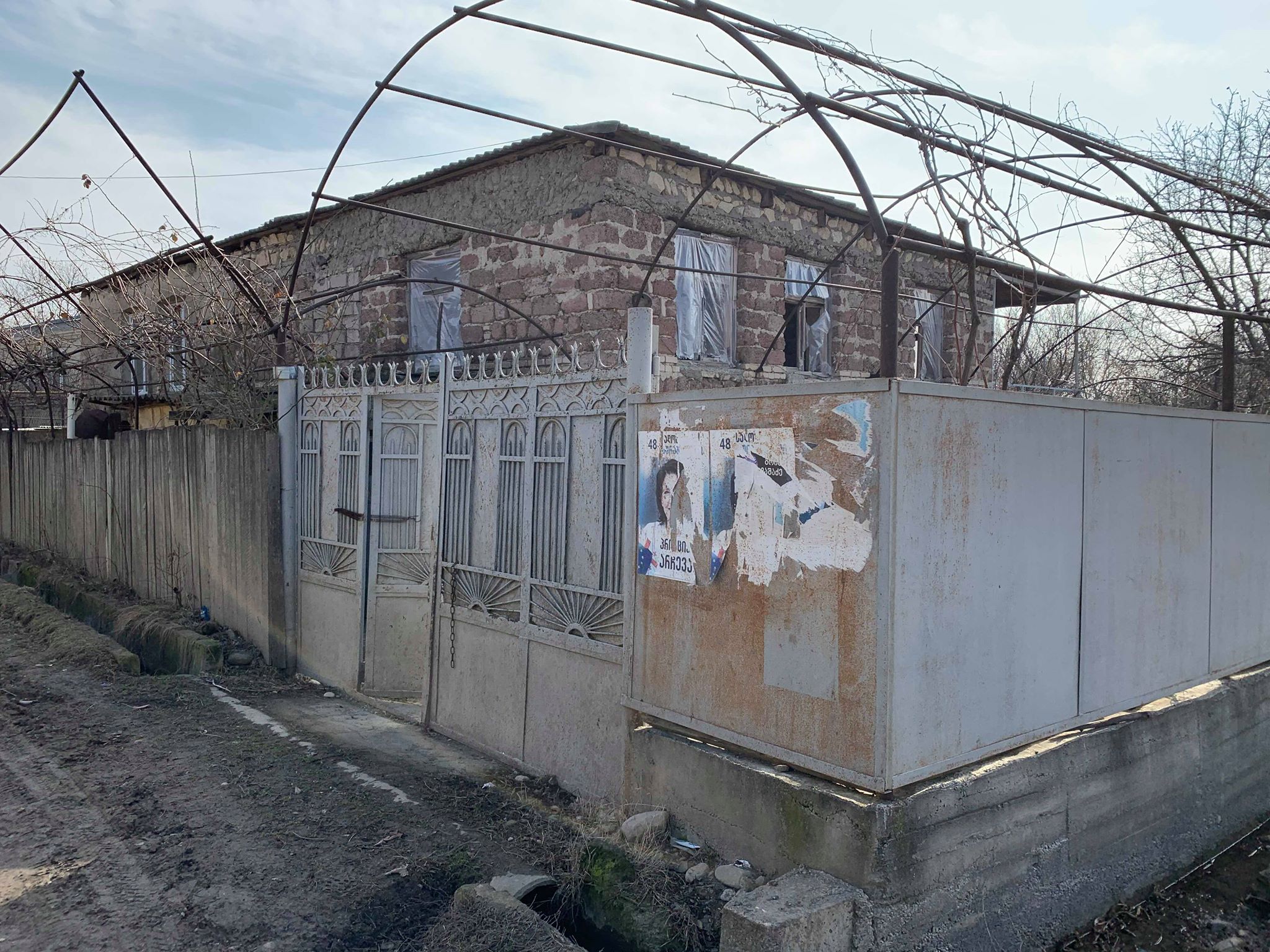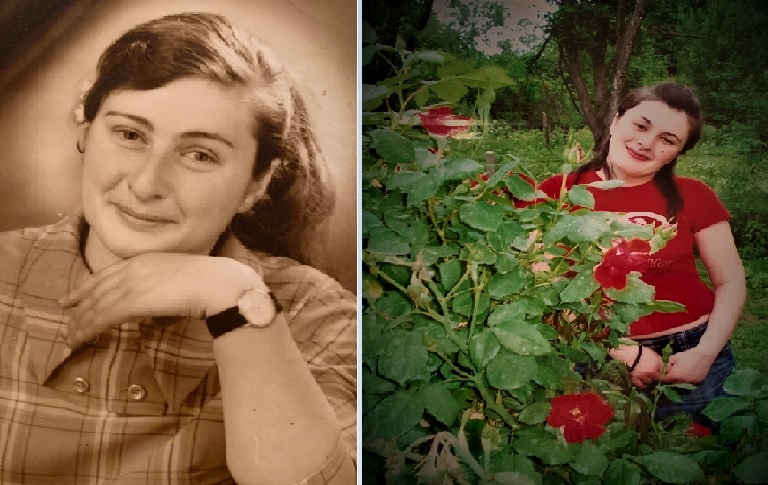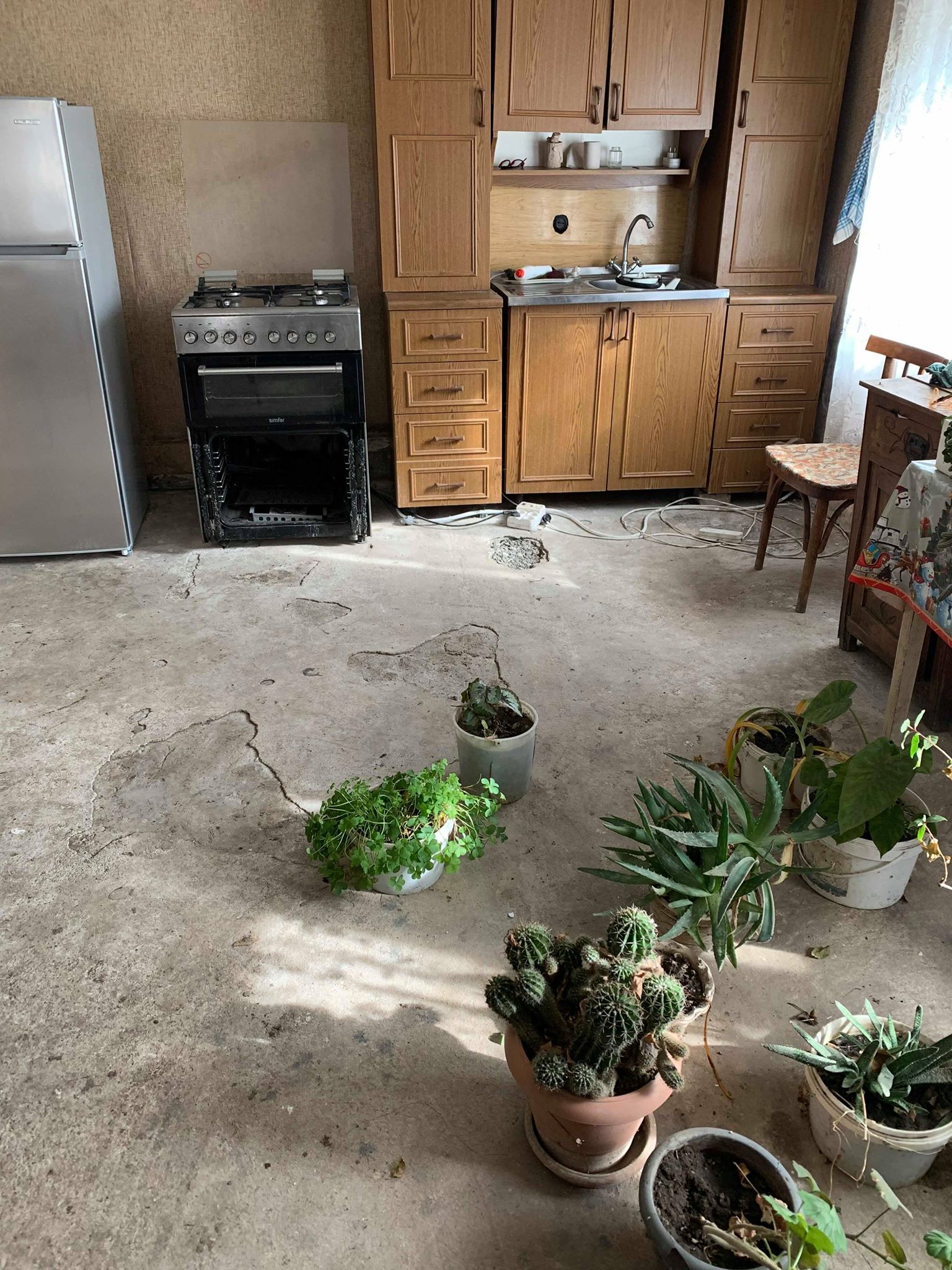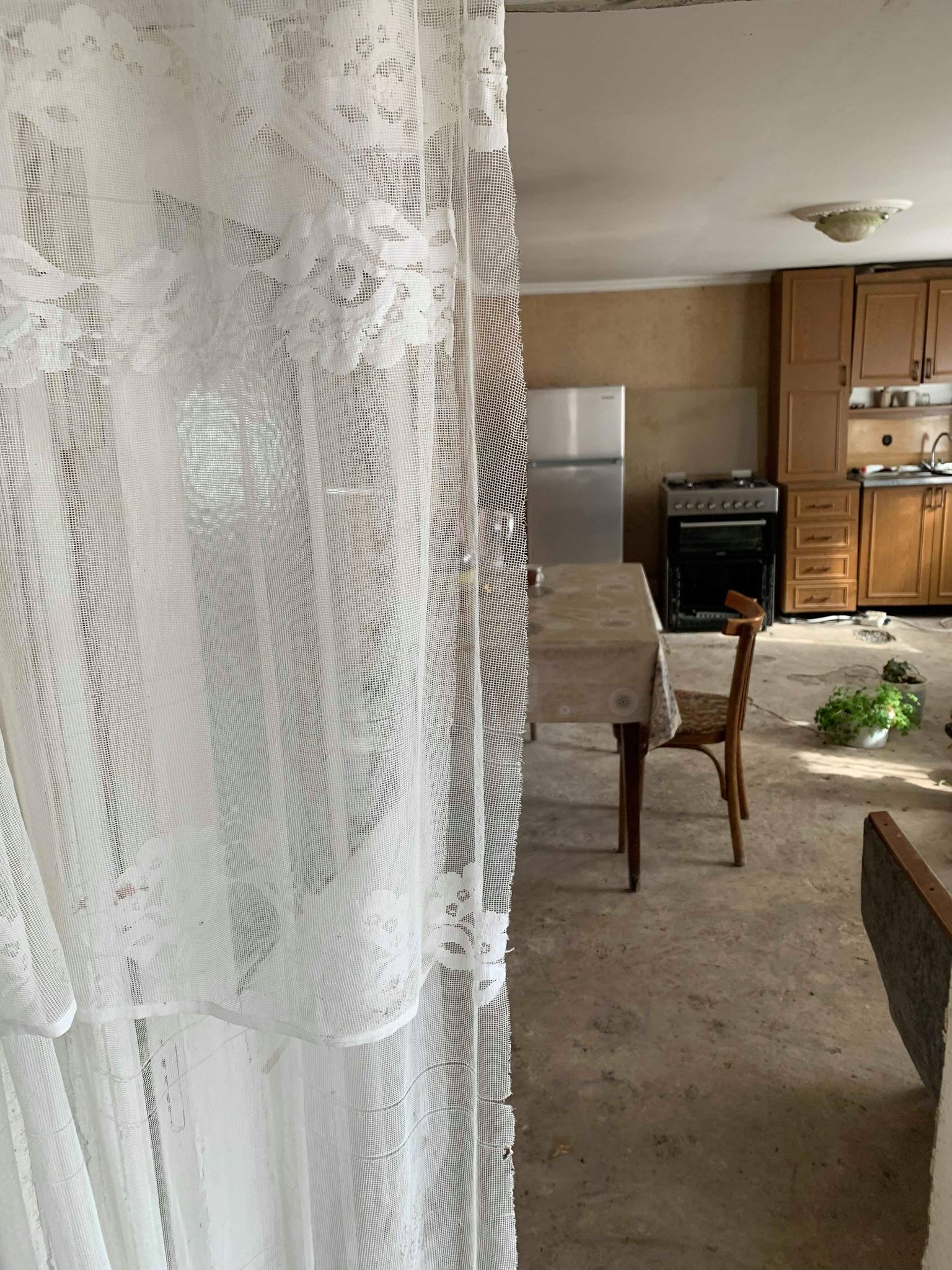By Gvantsa Sutidze

Nazi Jalabadze, whom neighbors also called Manana, lived in the village of Takhtisdziri. One of her three daughters, Meri often visited her in the village and stayed there for a night. She was in Takhtisdziri in June 2017. Mother and daughter were last seen on June 11. They were at their neighbors’ house untill late night.
Nearly at 11PM Meri went home. The next day, on June 12 they didn’t appear.

The neighbor Tina Koberidze remembers, that lights came out from their window for the whole day on June 12, however, nobody payed special attention to it.
On June 12, neighbors didn’t enter their house either. However, when they didn’t appear on June 13, two neigbors decided to look into the house and see if everythinhg was all right.
 Tina Koberidze says:
Tina Koberidze says:
“I asked the neigbor, if they had guests at the house, but no noise was heard. I called them in the morning, but nobody answred the phone. Then we decided to enter the house. First we called them from outside, but the gates were locked. Then we asked a neigbor boy to get inside and open the gates for us. We crossed the yard and headed towards the house calling their names. Nobody admitted that a thing like this might happen. In the entrance of the house, there were two slippers thrown upside down with the drops of blood on the floor between them. The door to the next room was wide open and Manana’s little dog was sitting on the porch. When we looked into the room, we saw a horrible scene. The mother was lying on the floor to the left side, as if she had hooded the robe and wore no slippers. Next to her, on the right, lay Meri, who had broken the oven glass with her head and the shards were scattered all around, blood was spilled all over the place.”
On hearing their screams, all neigbors gathered at the scene before the police came.
Nothing had been taken from the house. According to the neigbors, a small room, where they found the corpses, seemed to be tidied up.
According to the law enforcers, both - 66-year-old Nazi Jalabadze and 31-year-old Meri Japiashvihli had been shot in the head from a firearm. Their bodies were found to have physical injuries, and traces of beating. None of the signs of sexual violence was observed.
All the shelves were in order, even the coffee maker stood right on the gas stove. In summer, when everybody has their windows open and the village is quite densely populated, neigbors say that they heard no screams and no shots. Only one woman says she heard a weak sound of a gunshot, however, since the village is close to the occupation line, she didn’t pay much attention to what she heard.
Mzia Kopaliani says: “I heard the sound, but it seemed to be coming from distance. I couldn’t even imagine… I went to bed and fell asleep. When I came here on June 13, I remember there was a footprint on the fence, and on the ground there was a trace too. It seems that the offender climbed over this iron fence and took the same way back.”
June 11 was defined as the date of murder.
 From 11.30 PM untill 12 AM Meri Japiashvihli was reading Psalms, because her book of prayers lay open upstrairs.
From 11.30 PM untill 12 AM Meri Japiashvihli was reading Psalms, because her book of prayers lay open upstrairs.
It is supposed that the perpetrator entered the ground floor of the house first and Meri Japiashvihli went downstairs on hearing unusual noise. Time of death of the two women coincides.
Neighbors clearly remember that when they found the corpses, the TV was switched on in the room, but the sound was muted. However, as they recall, on june 12, the sound of TV coming from their house was quite loud and later it faded away. Based on this, neigbors suppose that:
*The next day the offender came back to the crime scene
*Muted the TV
*Tidied the room up
*Left the door open
On June 13, several hours after the corpses were found, the search was conducted in the neighbor’s - Omar Batsikadze's house. One bullet case was found in his house. The ballistic analysis revealed that the bullet case had been fired from the same rifle, which was used in the double murder.
On June 20, law enforcers started searching in Batsikadze’s land plot, a little bit far away from the village. 85 bullet cases, three magazines, and a firearm were found buried in the plot. A jacket was found among other things, which had a piece of paper with the phone number written on it in the pocket. According to the victims’t advocate, the phone number belonged to a person whom only Batsikadze’s father was acquainted with.
Expertise has revelead that mother and daughter were murdered with the Kalashnikov found in Batsikadze’s plot. According to the investigation, as a result of searches conducted in his house for several times, 7 old bullet cases were found on the perimeter.
Omar Batsikadze was detained for illegal purchase and keeping of weapons and ammunition.
The Gori City Court had justified him, but later the Appeal Court found Batsikadze guilty and sentenced him to imprisonment for a year and a half.
The victims’ advocate Revaz Revazishvili says, that prosecution was mislead as it charged him only under one article: “The Prosecutor’s Office should charge him not only for illegal purchase and keeping of weapons and ammunition, but also for premeditated murder. There was enough evidence for it. We do not say, that Omar Batsikadze is guilty, but we say that there is enough evidence to bring charges.”
Neither Omar Batsikadze's genetic material nor fingerprints are found on the scene. There is no witness who saw him entering or coming out of the house. His being in touch with the weapons or bullet cases couldn’t be proved either. Batsikadze's lawyer says that his client is innocent. According to him, anybody could hide the firearm in the plot located far from his house: "There is no evidence that my client has committed the offense, on the contrary, there is evidence, which exclude this."
Nazi, aka Manana Japiashvili had three daughters. Two of them got married and didn’t live in the village any more. Only Jilda and Juna remained from the family.
Juna had a wedding on June 4, 2017.

She was in her houneymoon trip, when she learnt that her mother and sister were murdered.
Their father has been considered missing after the wartime period in 1990’s, and since then Nazi was a single mother.
Juna got interested in the investigation proceedings from the very beginning. She frequently visits the Ministry of Internal Affairs and the Prosecutor’s Office to ask, why the person in whose plot the murder tool was buried has not been charged, and if he is not gulty, than why the investigation has no answers.
“When we go to the police, they say – we have investiagated the case – here is the person in whose land plot the firearm was found. But when we go to the Prosecutor’s Office, they say that they need additional evidence. I don’t want an innocent man to be punished. I want to know, who killed my mother and sister and why,” Juna says.
 She believes, that law enforcers didn’t investigate the case properly and didn’t search the the crime scene well. She names the following sircumstances as the basis for her presumption:
She believes, that law enforcers didn’t investigate the case properly and didn’t search the the crime scene well. She names the following sircumstances as the basis for her presumption:
“The examination of the bodies revealed that three bullets were fired. It seemes like they were shot from top, because the bullets were stuck in the concrete floor. Two bullets were found on the spot, however they had to go back to the scene to find the third one.”
According to Juna, law enforcers tried a lot, dug the concrete floor, however they couldn’t find the fragment of the bullet.
After they left, their cousin sifted the concrete which they had left on the scene and found the fragment of the third bullet.
One more circumstance: the genetic material of two unidentified persons was found on the TV remote control and the phone.
Investigation is ongoing.
DNA samples have been extracted from nearly 20 male villagers. But the fact, that when the corpses were found, the whole village had visited the scene before the police came, doesn’t exclude that the place got polluted.
Who killed the mother and the daughter and for what reason – is the question that villagers and the family members can only guess at.
The only thing Juna doubts is that she was newly married and maybe someone thought she left her money and jewelry with her mother in the village before she left for her honeymoon, but she says her mother and sister did not have any money or jewelry.
If the perpetrator came to rob them, he could not get any money and maybe because of it he assaulted them physically. Perhaps they recognized him and he decided not leave them alive.
The Prosecutor’s Office being responsible for supervising the investigation remains silent.
In the Ministry of Internal Affairs the investigation is ongoing under the Article 109 of the Criminal Code of Georgia. According to their written answer, various evidence obtained by the investigative actions confirmed that the suspect was in the village of Takhtisdziri on the night of the murder.In the framework of the ongoing investigation numerous complex investigative actions and expertise have been conducted, more than one hundred people have been questioned.
For years Nazi Jalabadze served as novitiate at the church. She baked communion bread and was going to become a nun.
The mother and the daughter were both buried in the yard of the church where she was going to continue her church life.
No one can recall that the family had an enemy.
After her graduation in Tbilisi, being temporarily unemployed, Meri mostly lived with her mother in Takhtisdziri.
After the murder in the village of Takhtisdziri in 2017, the villagers say they feel insecure and demand the answers to the questions: who and why beat the mother and the daughter so severely and then shot them in their heads just to make sure they were dead.
